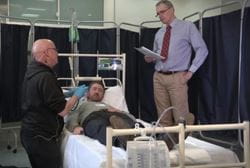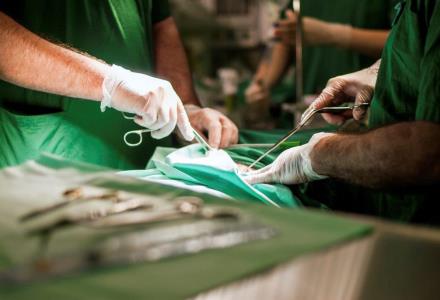Postoperative Care (eLearning)
What you'll learn
Providing better postoperative care will help to minimise complications and optimise surgical outcomes. Regardless of your specialty interest, this module will broaden your knowledge of the assessment and management of common postoperative conditions.
This module contains one or more Workplace Based Assessments (WBAs) that you are required to complete to obtain your module certificate. Please see the Format tab below for the details of these. For details on the overall module content, please see the Learning outcomes tab below.
RCS England members benefit from a 10% discount on this module. Find out if you're eligible to join or transfer.
- 10 PG Cert credits
- 0.0 CPD Points: TBC
Member Discount 10 %: £378.00
PGCert Low Income Country 40% Discount: £252.00
PGCert Student Discount 15%: £357.00
special rate as agreed: £
- Take this course as part of PG Cert in Surgery for £357 (15% discount) or if you are a RCS member or RCS associate for £378 (10% discount)
- You will have access to this module for 6 months, which you can extend for an additional 6 months for £130.
- Upon completion of your module, you will obtain a certificate of completion for this module.
- Please take a look at our Terms & Conditions if you need to cancel your access to this module.
Enrol for this module only
This module is run through RCS e-learning as a standalone module, part of a course or part of a PG certification.
Did you know?
You can do this module as part of the PG certification. To take this module as part of this certification find out more.
You've already enrolled on this module
Independent module or blended learning
If you're are taking this module independantly or as part of a course you can access your progress and continue the module via RCS England e-learning.
Via PG Certification
If you're are taking this module as part of the PG certification you can view your progress and continue the module via the PG cert dashboard.
You've already completed this module
Independent module or blended learning
If you're are taking this module independantly or as part of a course you can access your progress and continue the module via RCS England e-learning.
If you're are taking this module as part of the PG certification you can view your progress and continue the module via the PG cert dashboard.
Suitability
You can take this module as part of the PGCert in Surgery, designed for FY1-2 & CT1-2.
You can also take this module as a standalone online course at any stage of your career.
To be eligible, candidates need to have access to an Educational / Clinical Supervisor.
Learning outcomes
Topics you will cover include:
- the management of common postoperative complications;
- fluid balance in the postoperative period;
- postoperative nutrition;
- analgesia;
- the principles of enhanced recovery;
- haemorrhage and blood transfusion.
After completing this Postoperative Care module, you will be able to:
- Assess and manage common postoperative complications.
- Describe the principles of postoperative fluid balance.
- Identify the principles of postoperative nutritional support and its complications.
- Competently prescribe postoperative analgesia.
- Describe the pathophysiology of the surgical stress response and its adverse effects in the postoperative period.
- Describe enhanced recovery pathways and their role in mitigating the surgical stress response.
- Explain the implications of haemorrhage and the principles of blood transfusion.
Format
This is an interactive online module within the innovative RCS England e-learning platform. This format means you can study using any device, whenever and wherever it suits you.
This module requires the completion of 4 work place based assessments (WBAs). It is your responsibility to ensure that you have the capacity to complete the WBAs and that they are within your scope of practice in order to complete the module. WBAs cannot be missed or replaced with alternative activities. You will need to have an appropriate supervisor to complete these.
The WBAs include:
Either a Case Based Discussion (CBD) or a Clinical Evaluation Exercise (CEX)
- In your surgical practice, you will encounter numerous patients with postoperative AKI. Select one of these patients: consider their clinical condition, the cause of their AKI and it's management.
Either a Case Based Discussion or a Clinical Evaluation Exercise (CEX)
- Consider a postoperative patient in your care who developed CNS dysfunction following their operation. What was the underlying cause of their symptoms? How were they investigated and managed?
Case Based Discussion (CBD)
- Select a patient in your care who is receiving nutritional support. Consider their clinical condition, cause of malnutrition and benefits and risks associated with the type of nutritional support they are receiving.
Assessment of Audit (AOA)
- Once you are familiar with the principles of ERAS, examine the patient pathway on your current (or previous) rotation. Do you think the principles of ERAS are being adhered to?
For more information on WBAs, please consult the ISCP website. If you do not have an Assigned Educational Supervisor (AES) you can use the ISCP guidance to find a suitable alternative, for example within the Case Based Discussion guidance.
You will have access to this module for 6 months, which you can also extend.
You may be interested in the following modules
Associated courses
Receive PGCert credits for successfully completing selected courses. (The range of courses and dates are subject to availability).
CCrISP Care of the Critically Ill Surgical Patient (4 credits)
 A highly interactive course that will enable you to develop practical, theoretical and personal skills to systematically assess and manage critical situations.
A highly interactive course that will enable you to develop practical, theoretical and personal skills to systematically assess and manage critical situations.
This course is suitable for: CT 1-2.
Find out more
You will be awarded 4 PGCert in Surgery credits upon successful completion of this course
Specialty Skills in Emergency Surgery and Trauma (SSET) (4 credits)
 This two-day course will provide you with comprehensive knowledge and techniques to competently manage a wide variety of emergency on-call trauma situations.
This two-day course will provide you with comprehensive knowledge and techniques to competently manage a wide variety of emergency on-call trauma situations.
Suitable for grades FY2 and CT 1-2
Find out more
You will be awarded 4 PGCert in Surgery credits upon successful completion of this course
Contact the education team
If you have any questions about the PGCert in Surgery, or any other RCS courses, please get in touch.
The RCS Education Centre in London can be contacted directly on education@rcseng.ac.uk
We will endeavour to reply to you as soon as possible. Usually this is within a couple of days. Please note we do not work weekends.
Phone us
Call 020 7869 6300 to talk with a member of our team.
We are available to answer calls during our working hours of 8:30am - 4:30pm, Monday - Friday and there is a voicemail outside this time.
